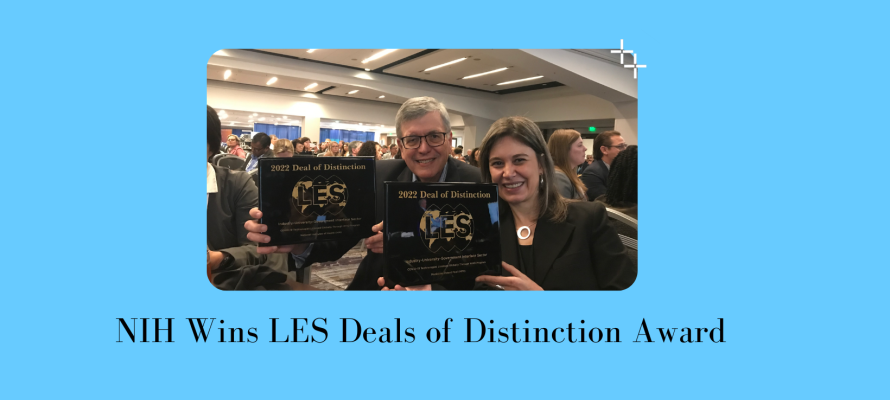NIH Wins Licensing Executive Society Deals of Distinction Award for WHO C-TAP Partnership

The NIH Technology Transfer Program has won the Licensing Executive Society’s Deals of Distinction award for 2022. The Deals of Distinction Award is given to an outstanding licensing deal from the past year. Steve Ferguson, Special Advisor at the NIH Office of Technology Transfer, recently attended the LES award ceremony to accept the award on NIH’s behalf. Continue reading to learn about this award-winning license agreement from Steve himself.
For this LES “Deals of Distinction” Award the National Institutes of Health (NIH) licensed COVID-19 technologies arising from our intramural research to the Medicines Patent Pool (MPP) for access through the World Health Organization’s (WHO) COVID-19 Technology Access Pool (C-TAP). These licenses for COVID-19 technologies will enable global manufacturers to develop COVID-19 vaccines, treatments, and diagnostics for low- and middle-income countries (LMICs), where access to COVID-19 countermeasures is severely lacking.
NIH technologies including the stabilized spike protein used in currently available COVID-19 vaccines, research tools for vaccine, drug, and diagnostic development as well as early-stage vaccine candidates and diagnostics contributed in a significant way to the licenses – all coming from 5 different NIH institutes.
The announcement of the licenses was made on May 12th by President Biden at the second Global COVID-19 Summit, cohosted by the United States, Belize, Germany, Indonesia and Senegal.
"As licensing professional, I must say it was indeed very exciting to have a US President announce your licensing deal on live TV! My colleagues and I at the NIH worked collaboratively with representatives of our WHO and MPP partners throughout the process in identifying appropriate candidate NIH technologies for licensing, establishing terms and conditions under the licenses and prioritizing increased access to and facilitating development of lifesaving treatments, vaccines, and diagnostics for people living in LMICs. The licenses, which are transparent (they are actually published on the MPP web site), global and non-exclusive, are expected to boost global supply of vaccines, treatments, and diagnostics for COVID-19 by facilitating the sharing of intellectual property, knowledge, and data with quality-assured manufacturers that have capacity to scale up production.
My boss, Health and Human Services Secretary Xavier Becerra perhaps summarized the impact of this effort best by saying 'Sharing our scientific knowledge and health technologies with C-TAP to foster the development of crucial medical countermeasures is another step we are taking to assist our global partners in our shared fight against this devastating disease.'" Shared Steve Ferguson.
To read more about NIH’s contributions to the WHO COVID-19 Technology Access Pool and the technologies involved, view this webpage.
